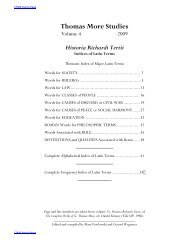life of john picus earl of mirandola - The Center for Thomas More ...
life of john picus earl of mirandola - The Center for Thomas More ...
life of john picus earl of mirandola - The Center for Thomas More ...
Create successful ePaper yourself
Turn your PDF publications into a flip-book with our unique Google optimized e-Paper software.
How much learning<br />
ought to be esteemed<br />
<strong>The</strong> good man<br />
travaileth <strong>for</strong> the<br />
pr<strong>of</strong>it <strong>of</strong> others and<br />
not <strong>of</strong> himself or the<br />
advancement <strong>of</strong> his<br />
own name.<br />
[67]<br />
Devotion<br />
To love God<br />
18 <strong>Thomas</strong> <strong>More</strong>’s Life <strong>of</strong> John Picus<br />
while they live, and never good when they be dead. So much only ¦set<br />
he by his learning, in how much he knew that it was pr<strong>of</strong>itable to the<br />
Church and to the extermination 1 <strong>of</strong> errors. And over that,¦ he was<br />
come to that prick° <strong>of</strong> perfect humility that he little <strong>for</strong>ced° whether<br />
his works went out under his own name or not, so that they might as<br />
much pr<strong>of</strong>it as if they were given out under his name. And now set<br />
he little by any other books save only the Bible, 2 in the only study <strong>of</strong><br />
which he had appointed himself to spend the residue <strong>of</strong> his <strong>life</strong>, saving<br />
that the common pr<strong>of</strong>it pricked him when he considered so many and<br />
so great works as he had conceived and long travailed upon, how they<br />
were <strong>of</strong> every man by and by° Δ3 desired and looked after.¦<br />
⌐ How much he set more by Devotion than Cunning. ¬ <strong>The</strong> little affection<br />
<strong>of</strong> an old man or an old woman to Godward (were it never so small)<br />
he set more by than by all his own knowledge as well <strong>of</strong> natural things<br />
as godly. And <strong>of</strong>tentimes in communication he would admonish his<br />
familiar friends how greatly these mortal things bow and draw to an end;<br />
how slipper° and how falling 4 it is that we live in now; how firm, how<br />
stable it shall be that we shall hereafter live in, whether we be thrown<br />
down into hell or lifted up into heaven. Where<strong>for</strong>e he exhorted them<br />
to turn up their minds to love God, which was a thing far excelling<br />
all the cunning 5 that is possible <strong>for</strong> us in this <strong>life</strong> to obtain. <strong>The</strong> same<br />
thing also in his book which he entitled De Ente et Uno 6 lightsomely<br />
he treateth, where he interrupteth the course <strong>of</strong> his disputation and<br />
turning his words to Angelus Politianus 7 (to whom he dedicateth that<br />
book) he writeth in this wise: “But now behold, O my well-beloved<br />
Angel, what madness holdeth us. Love God (while we be in this body)<br />
we rather may, than either know Him or by speech utter Him. In loving<br />
Him also we more pr<strong>of</strong>it ourselves, we labour less and serve Him more;<br />
4 prick acme, height / <strong>for</strong>ced cared / 11 by and by immediately / 17 slipper unstable, insecure<br />
¦ 1 <strong>More</strong> omits agnovimus, “we recognized that” (CW 1:324, 325). / 3 <strong>More</strong> omits percepimus, “we<br />
perceived that” (CW 1:324, 325). / 11 <strong>More</strong> omits sed & immature exigi, “but were also sought<br />
<strong>for</strong> even be<strong>for</strong>e they were ripe” (CW 1:324, 325).<br />
1. extermination: <strong>More</strong> condenses the Latin—eliminandis explodendisque, “banishment and confutation”<br />
(CW 1:324, 325).<br />
2. Bible: <strong>The</strong> Latin reads veteri novoque testamento, “the Old and New Testaments” (CW 1:324,<br />
325).<br />
∆3. by and by: <strong>More</strong>’s substitution <strong>of</strong> the Latin passim, “everywhere” (CW 1:324, 325).<br />
4. falling: <strong>More</strong>’s translation <strong>of</strong> the Latin fluxum, “fleeting” (CW 1:326, 327).<br />
5. cunning: <strong>More</strong>’s translation <strong>of</strong> cognitioni, “knowledge” (CW 1:326, 327).<br />
6. A treatise on questions <strong>of</strong> being and unity whose full title is De Ente et Uno ad Angelum Politianum,<br />
the work was written by Picus in 1491 but only published posthumously.<br />
7. A poet and fellow humanist, Angelo Poliziano (1454–1494) was among Picus’ close friends.<br />
5<br />
10<br />
15<br />
20<br />
25











